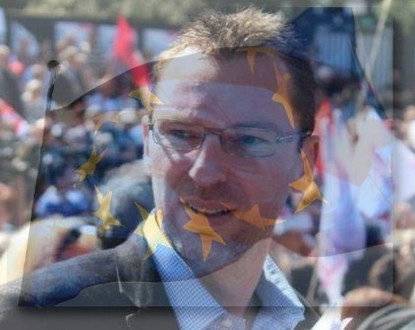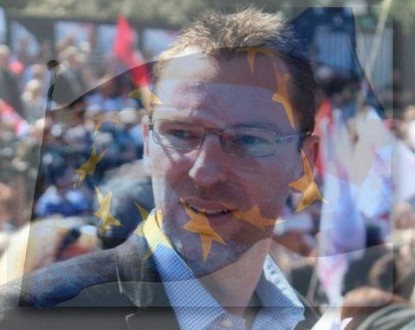As part of the debate for the European elections on May 25, Nice Premium asked representatives of all political parties running to freely and independently express their ideas and proposals. Xavier Garcia is the spokesperson for the Socialist Party 06. No candidate from this department appears on the party’s electoral list in the Southeast district.
 Nice-Premium : Should there be more Europe with common structures and a shift towards a federalist system? Or, on the contrary, less Europe and a return to national sovereignty and areas of commercial exchange?
Nice-Premium : Should there be more Europe with common structures and a shift towards a federalist system? Or, on the contrary, less Europe and a return to national sovereignty and areas of commercial exchange?
Xavier Garcia: More Europe, definitely. However, there needs to be a minimum of tax harmonization, a convergence on public policies or investments. Also, agreeing on an increase in the budget. Unlike the states, the EU is not in debt. A recovery through infrastructure policies and unifying vectors is needed.
Less Europe, I don’t believe in it. The crisis affected everyone, Europe is not responsible for the crisis. Turning it into merely an area of exchange is unbearable, the European Parliament doesn’t have enough power. The current vision of the states, due to the crisis, is very national and we have even come, through national selfishness and short-sighted accounting management, to question food aid to the poorest… Once Europe had consequences on the daily life of people, the impulse is to make cuts! Europe can be a vector of growth and power if it speaks with one voice. Currently, this voice is liberal and the European elections are an opportunity to change this logic. If the left becomes a majority in the European Parliament and Martin Schultz becomes president of the Commission, European governance can be steered in the right direction.
Nice-Premium : What are the risks facing Europe today? Can the financialization of the economy return to political, thus democratic, control?
Xavier Garcia: The risk of implosion due to the Greek crisis or questions about the survival of the Euro has passed, the crisis is under control. The risk today is economic stagnation due to austerity policies following the 2008 housing crisis and the lack of political ambition of the Union. Governments claim to be in favor of financial regulation, Europe could be a driving force but it is not playing its role because governments are hesitant. Establishing a financial transaction tax on a European scale would give more weight, serve as an example, and could reduce part of our debts at the same time. But Europe is no longer economically advancing and the cause of this is the strong euro, we all agree. But unlike others, I prefer to reform the euro than to question everything.
Nice-Premium : Is the Euro a protective “ecu” or an intellectual ambition? What kind of common budget policy? What kind of tax harmonization to avoid bidding wars between “competing” countries?
Xavier Garcia: The euro did not stem from an economic will but rather a way to consolidate European construction and make Europe’s economic governance inevitable. The euro is here, but economic governance is much more complicated due to the still intergovernmental nature of decisions at the European level. But the euro is protective, there is less fear of devaluation on the investors’ side, and it should be noted that we pay as much interest on loans today as we did 20 years ago when we were much less in debt because we can borrow at very attractive rates thanks to the stability of the single currency. But the euro is overvalued, in part because of Germany, which has an obsession with strong currency and fighting inflation due to its history. Germany has built an economy adapted to a strong currency but this is not the case for the rest of Europe, especially France. The strong currency dogma has some advantages. We pay less for oil, trips outside Europe are more pleasant… But it is not economically viable. The Japanese, Americans, and Chinese play a lot with their currency to regain margins and restart the economic machine when it is stopped, we are the only ones to deprive ourselves of this weapon. But leaving the euro, as the FN wants, would be madness. Predicting better days thanks to an exit from the euro is to forget the situation before the single currency and is irresponsibly optimistic. We are in uncharted territory because nothing has been planned, especially the repayment of public debt but also French private debts held abroad that represent 150% of our GDP. If we think that financial institutions holding household debt will let everyone repay their credit in a franc devalued by 30%, we are living in a parallel world.
Nice-Premium : Structural reforms to liberalize the labor market and reduce its cost, sustainably reduce public spending and restrict the welfare state’s scope.
Xavier Garcia: Germany has lowered wages to give competitiveness to its industry. But this was done in a context where other countries were not practicing austerity and could buy their products. The problem today is that all European countries are jointly pursuing austerity policies and the effect on public debt is almost zero because if no one is able to consume due to austerity there cannot be growth and therefore no additional tax revenues.
Today, across Europe, public spending is being reduced, if wages were also decreased, an immediate recessionary effect would occur. On the other hand, lowering the cost of labor, yes. It’s the logic behind François Hollande’s responsibility pact, where part of payroll taxes will be shifted to VAT and a reduction in expenses.
The welfare state was designed post-war to respond to life’s accidents. Today it needs to be reconsidered what the right calls “welfare”, meaning giving social benefits without effectively helping beneficiaries to get out. We must adapt our training systems and put a lot of effort into training unemployed people and addressing school dropouts. I am against going back on the universality of benefits, and if there are margins within the multi-level governance of local authorities, the state civil service is no longer able to absorb savings.
But there are innovative approaches to consider that would not necessarily cost more. The welfare state needs to be reformed in this period of crisis but not by cutting benefits. We must not shy away from looking at what works in Northern Europe, notably in Denmark. The European Union should also serve for this purpose.
Nice-Premium : Is it alarming that France is deindustrializing? Is the innovation economy an answer? What policies to support?
Xavier Garcia: Yes, of course, it is alarming. It is even one of the major problems of our economy. When one wants to manufacture in France, it is not always possible. For example, a company that designs the phones of tomorrow in France has to manufacture them in China because all components are already made there and it would be necessary to pay customs duties to import each component. And we see that our industrial leaders are threatened due to a lack of strategy. Alstom is the latest example.
Competitiveness is not just about wage levels, it is also and above all about the right strategies and investments, and France has missed turning points, especially in our automotive industry. However, France is not without assets, we have one of the best productivity rates in the world, which is an advantage, like the quality of our infrastructure and public services. But trade protections must be discussed, the European Union must better protect itself against often unfair competition from China or emerging countries.
However, as with currency, there is an ideological reluctance within European institutions against trade barriers even though they have a duty to protect us as other countries protect themselves, with measure but also firmness. Consumers must also be better informed, the French are more inclined to buy European and French because it is a guarantee of quality and also a patriotic gesture that in many cases many of our fellow citizens would be willing to make, if only they knew that, for instance, toothbrushes are still manufactured in France (https://www.labrosseriefrancaise.net/brosses-a-dents.php). What Arnaud Montebourg has done for the rehabilitation of “Made in France” should serve as an example in this regard.
Nice-Premium : Is the concept of an ethnic nation still the answer to globalization? France invented the civic nation, based on values, regardless of origin: is fraternity still relevant?
Xavier Garcia: The ethnic nation is not the French conception, it is the German one. In France, our tradition is the right of the soil. The foundation of our republican pact is this ability to assimilate, even if it is undermined by the difficulty of integration in a country in crisis. The right of the blood would not be rediscovering our roots; it would be denying who we are instead.
I believe in the nation, yet I wish for more power for the EU. I believe that national identity is not dissolvable in the EU, I am not less French because I support European construction. France will always have its history, its unique values, its attachment to the flag… All that will not be called into question. It must be understood that delegating part of our economic power will no longer be an issue the day European institutions function democratically.
France will not become the United States, we will not replace the French flag with the European flag, each country has its own history. But I wish that, at an economic level, the EU can develop growth policies through common investments (like a European high-speed line, for example) and that it can speak as an equal with China or the United States, which France can no longer do alone.
We are bound by a common currency but we must still invent a common destiny, and adding an identity layer is not bothersome. I am from Nice, I feel Niçois, it does not prevent me from feeling profoundly French, from getting chills when I hear the Marseillaise. It also does not prevent me from being happy to be European, to have studied in Great Britain – thanks to a European program –, to share things with other Europeans and to feel even more French through this sharing.
By layering identities, we do not dissolve our attachment to the French nation, on the contrary. If Europe is at the heart of today’s problem due to its poor governance, it is also the only solution to get out of the crisis.




